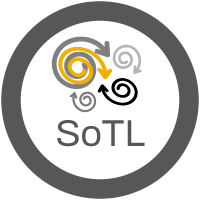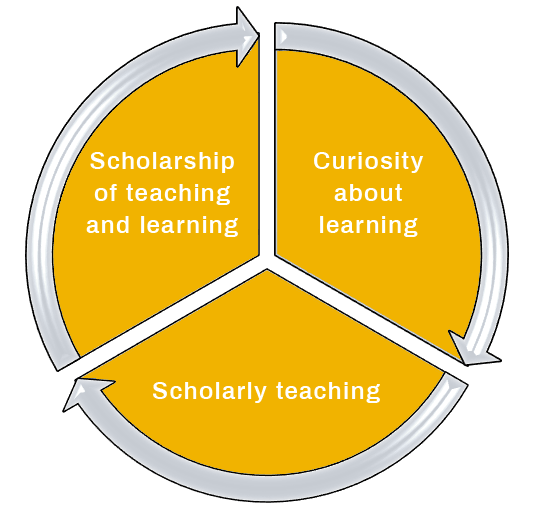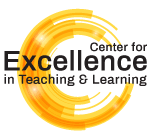| |
CETL | Canvas | AI Guide | Course Design | Online | Software | Workshops
Scholarly Teaching & SoTL
| If we look at teaching and learning as a research question, we would reasonably look at what we're doing and ask: "but are they learning?" Scholarly Teaching is about structuring and delivering our classes with this question – and an attempt to answer it — in mind. The Scholarship of Teaching and Learning (SoTL) takes this one step further by going public with the process and the answer(s). Both are curiosity-based.
|
|
RESOURCE MATERIALS
|
 Scholarly teaching and the scholarship of teaching and learning (SoTL) are closely related professional activities. Whereas aspects of the former—designing and systematically analyzing the impact of teaching innovations on student learning experiences, for instance—are essential to the latter, SoTL is distinguished by its public presence. Like all scholarship, SoTL must "go public." It must be seen or heard or read—and ultimately validated—by the larger academic community. As such, SoTL is scholarship. Scholarly teaching and the scholarship of teaching and learning (SoTL) are closely related professional activities. Whereas aspects of the former—designing and systematically analyzing the impact of teaching innovations on student learning experiences, for instance—are essential to the latter, SoTL is distinguished by its public presence. Like all scholarship, SoTL must "go public." It must be seen or heard or read—and ultimately validated—by the larger academic community. As such, SoTL is scholarship.
As the field has taken shape, and as our pedagogical interests have become increasingly engagement-oriented, we have begun to consider more seriously and systematically the scholarship of engagement and engaged scholarship. University of Idaho is unique in that we genuinely aspire "not to be served, but to serve." This is evident in our classes, our internship programs, and our commitment to be an "engaged campus." While the opportunities for faculty to engage in the scholarship of teaching, learning, and engagement have never been more robust, the standards of journals have become increasingly rigorous. CETL is here to help.
Brian Smentkowski is an internationally-recognized scholar of teaching, learning, and educational development, having served as an original leader of the Carnegie Academy for the Scholarship of Teaching and Learning (CASTL), specifically with regard to Building SoTL Communities; Editor in Chief of To Improve the Academy: A Journal of Educational Development; active member and presenter for the International Society for the Scholarship of Teaching and Learning; Teaching as Research (TAR) leader for the Center for the Integration of Teaching, Research, and Learning (CIRTL); and author of both first-generation and recent publications on "doing" and supporting SoTL. He has helped scores of faculty across all academic disciplines present and publish SoTL work, and serves as a mentor to several Ivy League and top R1 institutions seeking to enhance the quality, value, and impact of SoTL and educational development on and beyond their campuses. Brian is here to work with all faculty interested in imagining and executing creative and fruitful scholarly teaching and scholarship of teaching and learning project.
 Sound, empirical SoTL work requires a considerable amount of preparation and effort as well as a familiarity with a new(ish) and (at least slightly) different vocabulary and process, but the key attributes of the scientific method and the active research cycle apply and can be learned in an intentional and successful manner when well planned. Please contact Brian through email to express your interest in SoTL. Sound, empirical SoTL work requires a considerable amount of preparation and effort as well as a familiarity with a new(ish) and (at least slightly) different vocabulary and process, but the key attributes of the scientific method and the active research cycle apply and can be learned in an intentional and successful manner when well planned. Please contact Brian through email to express your interest in SoTL.
SoTL Starter Kit
In order to help us organize our thinking about scholarly teaching and the scholarship of teaching, learning, and engagement, please consider the following selected resources, many of which are available through CETL:
Video Resources:
If you're interested in reading a seminal article on Scholarly Teaching:
- Randy Bass, "The Scholarship of Teaching: What's the Problem?" in Inventio: Creative Thinking about Learning and Teaching (February, 1999) Vol 1, No 1: What's the Problem?
- The Director of CETL got Randy Bass to revisit this question for To Improve the Academy in 2020. Check out What's the Problem Now?
If you're interested in developing and launching a SoTL project:
- Cathy Bishop-Clark and Beth Dietz-Uhler, Engaging the Scholarship of Teaching and Learning: A Guide to the Process, and How to Develop and Project from Start to Finish, Stylus Publishing (2012).
If you're interested in the big picture and want to be inspired by work in and across the disciplines:
- Kathleen McKinney, Enhancing Learning through the Scholarship of Teaching and Learning: The Challenges and Joys of Juggling, Anker Publishing (2007).
- Kathleen McKinney, The Scholarship of Teaching and Learning In and Across the Disciplines, Indiana University Press (2013).
If you are interested in the current state and campus integration of SoTL as articulated by some of its founding members:
- Pat Hutchings, Mary Taylor Huber, and Anthony Ciccone, The Scholarship of Teaching and Learning Reconsidered: Institutional Integration and Impact, Jossey-Bass (2011).
If you're interested in the scholarship of engagement, civic engagement and global service learning:
- Robert G. Bringle, Julie A. Hatcher, and Steven G. Jones, International Service Learning: Conceptual Frameworks and Research, Stylus Publishers (2011).
- Lynette Shultz and Tania Kajner, Engaged Scholarship: The Politics of Engagement and Disengagement, Sense Publishers (2013)
- Hiram E. Fitzgerald and Judy Primavera, Going Public: Civic and Community Engagement, Michigan State University Press (2013).
- Anne Colby, Elizabeth Beaumont, Thomas Ehrlich, and Josh Corngold, Educating for Democracy, Jossey-Bass (2013).
- David P. Redlawsk, Tom Rice, et al, Civic Service: Sevice Learning with State and Local Government Partners, Jossey-Bass (2009).
- Kelly Ward, Faculty Service Roles and the Scholarship of Engagement. ASHE-ERIC Higher Education Report. Jossey-Bass,
Going Public: Conferences and Journals
As SoTL presumes "going public" with one's findings, it is helpful to have an idea of some of the major conferences and journals dedicated to this area of inquiry. What follows is a highlights reel version of conferences and journals—a much longer list, including discipline-specific options—is available through CETL. One of our "jobs" is to help you find the right home for your work, and opportunities for you to become more engaged in SoTL, so please make it a point to discuss your interests with our director, Brian, through email.
Major Conferences
Select Journals
Making SoTL Work and Matter
- The SoTL scaffold: Supporting evidence‐based teaching practice in educational development. L Cruz, K Cunningham, B Smentkowski, H Steiner. To Improve the Academy 38 (1), 50-66.
- Opposing forces: Institutional theory and second-generation SoTL.
L Cruz. International Journal for the Scholarship of Teaching and Learning 8 (1), 1.
- Recognition and Reward: SOTL and the Tenure Process at a Regional Comprehensive University. L Cruz, J Ellern, G Ford, H Moss, BJ White. MountainRise 5 (3).
SoTL-Related Initiatives at the University of Idaho
Teaching as Research(TAR)
As part of the University of Idaho’s membership in the Center for the Integration of Research, Teaching, and Learning (CIRTL), the Center for Excellence in Teaching and Learning supports all faculty, graduate students, and post docs in enhancing learning through diversity and in improving STEM (and all) education by approaching teaching as research. More can be learned through Brian Smentkowski's slide presentation titled: What is CIRTL?.
University of Idaho Teaching Innovations Program (UI TIP)
UI TIP supports and rewards faculty efforts to engage in scholarly teaching with the prospect of generating a scholarship of teaching and learning that enhances pedagogical innovation on and beyond campus.
"We do not learn from experience
…we learn from reflecting on experience."
The Idea
The purpose of the Teaching Innovations Program is not to reinvent the wheel but to support, recognize, and reward faculty who wish to reflect and refine even a single practice that can make a big difference in your students' learning. This can include a new –or new to you-- technology or teaching tactic or an existing practice you wish to replicate or modify to attain a learning goal. The idea is to foster creative solutions to specific teaching and learning challenges and to think about how they may inform future practices.
The Goal
- To develop and disseminate creative solutions to reaching and teaching our students within and across different instructional modalities;
- To foster creative solutions that will enrich the teaching and learning experience and inspire innovation across campus;
- To solve pedagogical challenges brought about by Covid-19; and
- To use experience as a foundation for trying something new or replicating and assessing the impact of something you have done to improve teaching and enhance learning.
2021 Participants
- Alina Dragulescu Andrasi. Why Are We Learning These Things?
- Ann Abbott, Theresa Allen, Suzanne Cazeau, Christin Fort, Samuel Johnson. Engaging Students through Applications, Cohorts, and Communication
- James Moberly, Kris Waynant. Interdisciplinary Polymer Hydrogel Research as a First-Year Honors Laboratory Experience
- Lori Baker-Eveleth, Michael Overton, Barrie Robison. Interdisciplinary Data Visualization Course
- Ryan Lincoln. Hands-on and Hyflex--learning legal skills in a collaboratively but socially distanced classroom environment
- Stephen R. Miller. Using Retrieval Practice to Supplement the Socratic Method in Legal Education
- Xiao Hu. Reshaping Design Education: Developing A Studio-Based Online Instruction for Cross-Disciplinary & Cross-Cultural Learning
- Adam M. Sowards. Ungrading to Promote Intrinsic Motivation, Student Self-Determination, and Meaningful Feedback
- Aleta Quinn. Environmental Philosophy for Online M.S. Environmental Science Students
- Amin Ahmadzadeh. A Different Approach in Pedagogical Model: Flipped Classrooms (blended learning)
- Elizabeth Wargo. Design for Education Change
- Jaap Vos. Balancing time commitment and personal interaction in an online course
- Kevin Chang. Assessment of Student Homework Self-Grading
- Lauren McCleary. Re-Designing Sustainable Assessment Strategies for an (Extra) Large Course
- Markie McBrayer. The Effects of "Flipped" Labs and Workshops on Undergraduate Student's Data Literacy
- Robert Heinse. Innovating soil physics teaching from wizardry at the chalk board to flipping a HyFlex course
- Aleksandra Hollingshead. Exploring Universal Design for Learning Framework in an Online Class
- Elizabeth Cassel, Erika Rader. Adapting the Field Guidebook to Student Needs and Expanding Accessibility to Local Geology
- Jeffrey Bailey. Helping Students to Idenify with, Feel Responsible for, and Engage in a Course with Virtual Meetings
- Kate Kolpan. Facilitating More Dynamic "In Class" Discussions via Zoom
- Rachel J. Halverson. Assessing Student Language Acquisition: Development of a Four-Skill Final Portfolio
- Stacy Isenbarger. Clarifying Strategies for Productive Exchange and Archiving in Studio Art + Design Classrooms
|



 Scholarly teaching and the scholarship of teaching and learning (SoTL) are closely related professional activities. Whereas aspects of the former—designing and systematically analyzing the impact of teaching innovations on student learning experiences, for instance—are essential to the latter, SoTL is distinguished by its public presence. Like all scholarship, SoTL must "go public." It must be seen or heard or read—and ultimately validated—by the larger academic community. As such, SoTL is scholarship.
Scholarly teaching and the scholarship of teaching and learning (SoTL) are closely related professional activities. Whereas aspects of the former—designing and systematically analyzing the impact of teaching innovations on student learning experiences, for instance—are essential to the latter, SoTL is distinguished by its public presence. Like all scholarship, SoTL must "go public." It must be seen or heard or read—and ultimately validated—by the larger academic community. As such, SoTL is scholarship. Sound, empirical SoTL work requires a considerable amount of preparation and effort as well as a familiarity with a new(ish) and (at least slightly) different vocabulary and process, but the key attributes of the scientific method and the active research cycle apply and can be learned in an intentional and successful manner when well planned. Please contact
Sound, empirical SoTL work requires a considerable amount of preparation and effort as well as a familiarity with a new(ish) and (at least slightly) different vocabulary and process, but the key attributes of the scientific method and the active research cycle apply and can be learned in an intentional and successful manner when well planned. Please contact